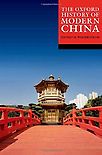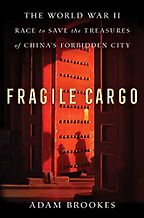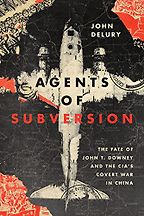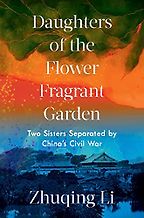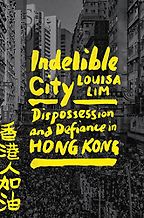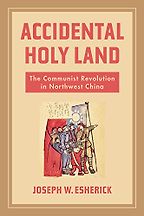Thank you for choosing the best books about China published in 2022 for us. You’ve chosen quite a few history books for this year: no fiction. Is there a particular reason for that?
There are some artificial and tricky things about all books of the year lists and, at least in my case, I find that if I’ve done one the previous year, I’m influenced by the choices I made then. I felt bad last year that I short-changed historical works, so I wanted to make up for that. In a sense, I also had my say on new fiction I admired with a TLS review (in the July 8 edition) of two 2022 publications I liked a lot: a collection of short stories by Gish Jen (Thank You, Mr, Nixon) and a novel by Xue Yiwei (Celia, Misoka, I).
There is also one book in particular I felt bad about leaving out last year and now feel bad about leaving out this year. It was published on one side of the Atlantic in 2021 and the other side in 2022, so it just slipped through the cracks with me, so I do want to give a special shout-out to it at the start. It’s Henrietta Harrison’s The Perils of Interpreting and it’s a really marvelous book that employs what, as a Tom Stoppard fan, I sometimes describe as a “Rosencrantz and Guildenstern Are Dead Approach” to the past. That is, the author takes figures often relegated to the margins of a story and places them at the center and sees how this puts events and characters that are well-known in a new light. In this case, the people moved to the center of the tale are a British interpreter and a Chinese interpreter involved in the famous 1793 meeting between the Qianlong emperor and Lord Macartney. I was glad to see History Today flagged it as one of their books of the year. It’s a wonderful example of an academic writing in a very accessible and engaging way and moving between China and the West in a fashion that ends up unsettling a lot of assumptions about a period in the past.
Okay, let’s turn to the five books that did make your 2022 list. The first one is Fragile Cargo which is by journalist Adam Brookes. It’s very evocatively written, starting with a description of the Qianlong emperor—we can’t seem to get away from him—going about his daily routine. Tell me what it’s about and why you chose it.
The elevator pitch for this book is The Monuments Men, the China side of the story. It’s about how people tried to preserve these precious works of art during wartime. It very much takes you into life within a fragmented and embattled China during World War Two. Any book that does that for a popular readership is important because in the English language world, there is still a tendency to forget just how central the battles fought in Asia were. There’s a default to just thinking about the European war, or about Japan and America and Pearl Harbor. So, I liked that about it.
In addition, Brookes really makes some of the curators, who devoted themselves to going along with these works of art and hiding them in caves and other unlikely places, come to life as characters. There were very dramatic moments in the odysseys of the objects, and in describing them he draws on the diaries and in one case the poems of the curators to make them fleshed-out people.
Adam is, by the way, somebody who just won’t stay in his lane. He first made his mark as a journalist, but then he left journalism to become a spy novelist and wrote a trio of really engaging spy novels. Now he’s moving into the realm of serious popular history. His new book is clearly written with the general reader in mind, but he does his research. He was a Chinese studies major as an undergrad at SOAS and it shows.
I guess I can’t really pick on him, though, for going outside of his lane, because I move into the journalistic one plenty. In fact, we met when we were both tracking protests in 1999. I was in Beijing for a conference held to mark the 80th anniversary of the May Fourth Movement and he was covering China for the BBC when NATO bombs hit the Chinese Embassy in Belgrade. There were then these protests outside the British and American embassies, partially supported by the government. We became friends, in part because we realized that we were in different professions but were asking a lot of the same questions and were curious about a lot of the same things as we watched the people on the streets yelling out “Down with American-Led NATO Hegemonism” and other catchy slogans like that that just roll off your tongue.
And in terms of the overall story of Fragile Cargo, these treasures were in the Forbidden City, but then ultimately ended up in Taiwan?
One of the things about the story is that it resonates with and speaks to a lot of broad issues. Some of the treasures spirited out of Beijing when the Japanese invaded ended up back there but a lot of them ended up in Taiwan. You can think of it as a metaphor for the fact that in the middle of the century, people are moving across borders, but so are objects.
Brookes also does something that I love to see popular histories do which is slip in in passing ideas that scholars feel passionate about but that never seem to percolate through to the general audience. For example, when he talks about treasures representing Chinese culture, he refers to them representing what the state decided to define as Chinese culture at a certain point. When he’s talking about the Qianlong emperor gathering together these wondrous pieces of art, he makes it clear that it wasn’t that for thousands of years, there was a clear notion that the objects that we now think of as quintessentially Chinese were quintessentially Chinese. A lot of what we know about, and think about, modern China really took shape with these actions that members of an originally Manchu ruling family did after they took power in 1644.
How fascinating. Okay, let’s go on to the next of your 2022 China books, which is another page-turnery one. This is Agents of Subversion by John Delury. Tell me more.
This book has many of the qualities of a spy novel, though it’s a true story. Delury is an academic historian whose dissertation was about Qing intellectual history. He’s an American China specialist, but he teaches at Yonsei University in Seoul. Since moving to Korea, he has added a whole new side to his expertise and comments a lot in the press on North Korea. He’s also very interested in the Korean War. He is, in short, another person who won’t pick a single lane and stay in it.
This story is about an American secret agent who ends up in Mao’s China during the Korean War and is a prisoner there for a long time. Delury is ideally placed to write this tale because it moves between America, China, and Korea. Even more so because he studied at Yale, which figures centrally in the life of the main character in the book, John T Downey, who studies there before and ends up back in the area after his time in prison in China. Early in the book, Delury mentions that he was studying at Yale himself when Downey was living in the area and could easily have met him, but he didn’t.
In this book, you learn a lot about Mao’s China, you learn about the Korean War, you learn about McCarthyism in America and even about the history of Chinese studies. All this is woven into this page-turner. Like Fragile Cargo, I think Agents of Subversion is a book that you can easily imagine being filmed, being turned into a television series or being discussed with gusto by members of a book club made up of history lovers.
And this CIA agent, John Downey, spent 20 years in prison in Maoist China?
Yes. It’s a reminder of just how long the two places were cut off from each other. There are again all kinds of contemporary resonances that you can think about, though both Brookes and Delury are the kind of authors who trust the reader to make the connections themselves. We are now living in a time when China is again becoming less hospitable to foreigners. That’s not belaboured in the book, but it adds to the punch of the story. When I was reading it, I thought about the imprisonment of the two Canadians. They were clearly not agents of a foreign power, so there is a crucial difference, but there are interesting echoes between periods.
The other reason I like this book is I do think we’re more used to imagining these Cold War spy stories linked to the Soviet Union and Britain and the US agencies. Just the fact that it’s about the China side is intriguing.
Agreed. How well-known was this story when the book came out?
The basic story is quite well-known, but it’s one of those things that goes in and out of consciousness and you think, ‘Oh yes, there was that.’ But there are many elements to the book I had no idea about, like the intersections between different figures. I learned a lot. Delury’s background as an intellectual historian shows through and there’s a lot about the ideas that were circulating about totalitarian states and modernisation. You even get cameos by some leading political theorists. It’s very interesting.
He writes about George Kennan, doesn’t he?
Yes, George Kennan and Hannah Arendt. There are quite a few people who show up as characters who get swept up in the political tides of the time, including the China specialists. That’s another connection between my first two books: they’re stories that have strong characters in them. Even though they’re largely about events, you come away with a real feel for individuals.
The next book you’ve chosen is Daughters of the Flower Fragrant Garden by Zhuqing Li. It’s about her two aunts, who end up on different sides of the Chinese civil war. Is she also an academic?
She is, she’s a linguist at Brown University, but this is a memoir. It’s a very personal story informed by a scholarly set of interests. If Fragile Cargo is in part about objects that end up divided between the mainland and Taiwan, this is about a family that is divided. One sister spends most of her life in Taiwan and the other spends most of her life on the mainland. The book also fits with Agents of Subversion, because it’s about this period of disconnection and then reconnection. In this case, it’s not about the US and China reestablishing connection—though that was part of the background—but a story that is true for many families that were divided between China and Taiwan. One of the surprising things about the late 20th century was when members of families that had long been separated began to cross back and forth across the Taiwan Strait. The interconnection between them was a crucial factor in the economic boom of the 1980s and 1990s on the mainland, since investment funds also flowed across the water. That’s not a novelty but it’s worth being reminded of that. It actually gets forgotten in some of the press coverage of tensions between Beijing and Taiwan, that there really are a lot of families with a tie across the Strait.
But mostly it’s a very personal story. It’s a memoir and family history, driven by the author’s interest in figuring out the things that the family didn’t talk about. There’s a bit of the historian-as-detective in this book, as she tries to work out what was going on when her aunts were young.
Is the story of these women like many stories of China, with incredible ups and downs?
It is. Many books about Chinese families in the twentieth century that I find most compelling are the ones where you have a much more complicated idea, by the end, of what a small group of people went through. Too often, we imagine that there were clear winners and losers in the Chinese Revolution. There is a great deal of popularity for the stories where you know clearly which side you’re rooting for and a family is placed mostly or completely on one side. For example, a book that is not as big a deal in the United States, though it is fairly widely read there, but looms incredibly large for UK readers, is Wild Swans. That’s a family story where you have a sense of one throughline. Whereas I think the experience of the Mao period, as well as those just before and just after it, for many Chinese families was much more about ups and downs. Some members of the family were doing better and others worse, based often just on happenstance—where you ended up being.
You do get a sense of the individuals in this book. The women in the story are special and they’re not just passive agents. But there is a high degree of luck, which is something that also figures in this. The author herself, in some ways, was lucky. She benefited from having a relative who could help her get connected to the outside world, even though at an earlier point, you would have said, ‘How unfortunate to have a family whose members were disconnected that way.’ That captures something important about China and the China story.
Get the weekly Five Books newsletter
Looking ahead, I’m already reading a book I’m pretty sure will be on my list next year, Tania Branigan’s Red Memory, which is a book about the Cultural Revolution and how it’s remembered and thought about and forgotten in China. It’s coming out early next year, but I’m reading an advance copy to review. One of the things it does very well, again, is give you this idea that you can’t neatly break up Chinese families or even Chinese individuals into people who were steadily fortunate or steadily unfortunate. Some people are victims at one stage and victimizers at another. That’s part of what makes the 20th century both so tragic and so fascinating in the Chinese case.
Let’s go on to a book about Hong Kong now, Indelible City by Louisa Lim. She’s an international journalist, but she comes across in the book as a local, because she spent a substantial portion of her life in Hong Kong, didn’t she?
She wasn’t born in Hong Kong, but she grew up largely there. She’s an extraordinarily talented individual. She’s another journalist who did Chinese studies as an undergraduate and then, like Brookes, worked for the BBC. She then worked for NPR. Her first book, The People’s Republic of Amnesia, was one of the Tiananmen books that I singled out when I did a Five Books interview on that topic back in 2014. It was a daringly researched, wonderfully done book, and I feel Indelible City can be described with those same terms.
A key difference, though, is that this new work is much more personal. Lim is much more of a character in it and her life becomes part of the backdrop. She deals with a lot of things that sometimes are forgotten in the Hong Kong story, such as that Hong Kongers can be people with parents from different parts of the world. She talks about the experience of having that mixed parentage and how it’s seen when she’s in different parts of the world. One of the things that is special about Hong Kong is that you can be—or at least could be for a long period—fully part of the city, whatever your ethnicity, in a way that is very hard in any other parts of the PRC.
The book traces a graffiti artist, the ‘King of Kowloon,’ one of these figures who’s very known within Hong Kong, with lots of stories about him, but who gets forgotten outside. She has this fascinating set of stories and reflections about him, even as the book is largely about protests of recent decades that culminated in the upheavals of 2019 and harsh repression of 2020.
Lim also does a lot of self-reflection here on the role of a journalist who is so connected to the story that the line between journalist and activist is blurred. She’s part of the story. She wrote extraordinary pieces while the protests were going on in this vein, such as an FT article with the wonderful title “Hong Kong diary—’Don’t get tear-gassed, Mum!'” She co-wrote a piece with Ilaria Maria Sala, a wonderful Italian journalist (who has her own book out on Hong Kong, but it’s only in Italian, so, alas, I haven’t been able to read it, just admire its eye-catching cover). The two of them wrote a memorable commentary for the Guardian in 2019 about being journalists who were so tied to the city and cared so deeply about what was going on that it blurred the line. Journalists were also being targeted by the police during the protests at times. At times, reporters have claimed, it felt like being a war correspondent.
One of the things that’s interesting about this book, and Lim’s earlier book, is that while it’s largely a journalist doing serious reporting, she brings in findings from her historical investigations. Scholars maybe will appreciate that the most, and general readers might not realize how special it is. In The People’s Republic of Amnesia she wrote about the massacre in Chengdu that took place after the one in Beijing. She brings that much less well known massacre into the story in a way that’s very powerful. In Indelible City, she does some close archival readings of newly-brought-to-light documents that have to do with the negotiations on how exactly things would work—or were supposed to work—when Hong Kong was transferred from being a British colony to being a part of the PRC. The combination of discoveries about the time around 1997 and on-the-ground reporting about 2019 is extraordinary.
And is there an overarching thesis or point that she’s making about Hong Kong in the book?
Thanks for asking that. As a lead-up to answering the question, I want to mention two other really good books on Hong Kong that came out this year. One had a very similar title, The Impossible City: A Hong Kong Memoir, by Karen Cheung, which is a very personal story. It has a lot of parallels to Louisa’s book in the mixing of the personal and the political, though it’s somebody of another generation and with a different perspective. The other book that’s very special is City on the Edge: Hong Kong Under Chinese Rule by Ho-fung Hung, a Hong Konger who is a sociology professor at Johns Hopkins writing here in a very accessible way. What it has in common with Louisa’s book—and Louisa’s book was the one I chose, in part because it brought together elements of both those books—is giving Hong Kong a history that is not just reducing it to the story of what colonizers did to colonized people.
The tragic side of Hong Kong history is that Hong Kong’s people have undergone more than one process of colonization and never been able to control their own city, but the inspiring side of that same history is the determination and creativity local people have shown in the face of this. It’s a city that’s often thought of as defined by people in search of material comforts, or of money, but by finding a rebellious artist as a figure to focus on, Louisa brings in Hong Kong’s enduring rebellious tradition, and she, like Hung, brings up examples from earlier periods of feisty locals engaging in acts of resistance.
Let’s go on to the last book you’ve chosen for the best China books of 2022, Accidental Holy Land by Joseph Esherick. Tell me about this one, and why it’s good to read it.
It may seem that I’ve chosen this book just to have something by a leading figure in China scholarship, and Joseph Esherick has written decades’ worth of extraordinary, extraordinary books. He’s about 80 now and he’s published not just one but two books in the last twelve months. His other book, which I can’t wait to teach, is a collection of essays he’s written over the decades. They’re brought together into a collection for the first time and what he does—that’s rarely done when people do these ‘greatest hits’ volumes—is he introduces each essay by placing it into context of what was going on at the time, in terms of debates, and then reflecting on how he might have done things differently, if he’d been writing it later. So, there’s a self-reflective side to it. Like a lot of people coming out of the 1960s, Esherick was drawn to China studies because of criticism of imperialism related to anti-Vietnam War sentiment. There was a rooting for the Revolution, in many ways. One thing you see over the course of his career is his rethinking of some of his political positions—without giving up his rooting for underdogs and interest in ordinary as well as powerful people—and shifts in the way he does history.
Accidental Holy Land is a culmination of this. Even the title of it: he’s moved very far from the notion of grand historical forces shaping the direction of history, to being fascinated by contingency and happenstance. Another shift is that he began his career not being able to do research in China as an American. Over the course of his career, he was able to use archives in China, but also to do fieldwork. He did ethnographic work in rural settings, which not many historians do. His most important book before this one was a study of the Boxer uprising. In that, he tried to explain how very specific local dynamics, including the environment, mattered in an event often approached via a discussion of esoteric beliefs, and a concern with on-the-ground issues reappears in this new book. Being able to get from point A to point B, the terrain, all these things matter. That’s a common view now, but he was saying it before. He’s spent time taking trips to the areas where, in the case of this book, the Communist Party holed up when it was gearing up to make its final push toward power.
What is the ‘accidental holy land’?
There’s a grand narrative of the Chinese Revolution. It’s about how the Communist Party made this triumphant, Long March to escape from the Nationalist Party after it was almost extinguished. They ended up in North China living in isolated redoubts, one of the most famous of which is Yan’an. That’s where the idea of Mao as a sacred figure, the idea of the Communist Party having this miracle-filled, epic quest to save the country comes from. For the Communist Party, it’s a celebratory myth, a powerful story of victory over impossible odds. And we know the power of these stories in all mythic traditions, all the way up to The Lord of the Rings. You have these great heroic figures and terrible villains.
This is a story that scholars—but not just scholars—want to complicate by bringing in such things as internecine fighting that went on, the struggles between different groups. It wasn’t predetermined that one version of communist ideology would take hold. By posing ‘accidental’ with ‘holy land’ in the title, the book is suggesting that this was driven so much by contingency, by personalities, by the structures of the time. So it’s a case of retelling a grand narrative from a different perspective. That won’t shock scholars, but he does it with a granular detail and feel for the setting and the personalities that is special.
Five Books interviews are expensive to produce. If you're enjoying this interview, please support us by donating a small amount.
It’s a very relevant book to read right now because it’s about taking apart a mythic story, which is similar, in a way, to the mythic story that Xi Jinping’s cult is based on. If we think about it, the cult of Mao and all the early leaders of the Chinese Revolution, including Xi Jinping’s father, was all about spending time in the wilderness, in these very tough rural settings, where they really connected with the people. Then they had a mission to save the people and once they were in power, they would do things that were for the good of the people, and they would never forget their connection to the countryside and to villagers. We know that Mao got disconnected from the masses in many ways and did all sorts of things that caused enormous suffering, including actions that caused many villagers to starve, even though, at other times, he tried to do things for the people.
In Xi Jinping, you have a revision of that tale. He was sent down as a youth to the wilderness and he connected with the people. He’s presented as a man of the people, even though he spent his childhood in an elite setting and even though he’s now in power. This year, after he was given the go ahead to start a third term as General Secretary of the CCP and it became crystal clear that he could potentially stay in power much longer, even for life, the first place he took the Standing Committee was on a pilgrimage to Yan’an, to this holy land. Xi Jinping’s father figures in Esherick’s book and we now see his son trying to reenact things from that sacred generation’s life and reboot their epic story. It’s a different version, but one that resonates with that story of the man of the people from the wilderness who now exercises great power.
You mentioned contingency and how it’s not clear which way things could go. The same might be said of the protests in China these past weeks, including the late November ones triggered by the fire in Urumqi. We don’t know what’s going to happen next, do we?
One of the biggest takeaways of the last few weeks, just watching the news, is a reminder of how surprising struggles are. We can always take apart the road that led to them. But that doesn’t mean that the result was foreordained or to be expected. The same was true with the Hong Kong protests that are central to Indelible City. Lim and I were on panels together in the spring of 2019, looking back at the 30th anniversary of Tiananmen as well as the current state of Hong Kong, a city I too care passionately about. We were worried about the direction that things in Hong Kong were going with the tightening of controls. The Extradition Law had already been floated and there had been some small protests, but neither of us was saying, ‘Just wait till this summer, there’s going to be a grand, last-ditch effort to push back against mainland-isation.’ The way a variety of factors come together that just led people to feel, ‘Now, no matter what the potential cost, no matter how long the odds seem, this is a moment for action,’ that’s not something people saw coming. There’s something unpredictable about protests like this.
It seems fitting to end with one last book-related question. If someone’s particularly interested in the protests that have been going on in China in recent weeks and wants something to read that can help them put the events into perspective, what books come to mind as useful for them to turn to?
It could be valuable for them to pick up any of the works I mentioned in the 2014 Five Books interview on Tiananmen I mentioned earlier. This is not because these protests are just like Tiananmen, as they really are not despite how often allusions to 1989 have come up lately. There was, for example, a division within the elite that kept Tiananmen going, which there doesn’t seem to be here. But I do think those books all have insights to offer that have relevance right now, and I’d flag one in particular: New Ghosts, Old Dreams. It’s co-written by Geremie Barmé and Linda Jaivin. Barmé runs a wonderful website, China Heritage, that is filled with interesting translations and commentaries, including on acts of dissent. As for Jaivin, her latest book, The Shortest History of China, made my China books of the year list last year. The book they collaborated on decades ago, New Ghosts, Old Dreams, was about the 1989 protests, but also about the whole intellectual and cultural ferment of the 1980s. It really reminds you powerfully of the varieties of thought within China, even at times when the Communist Party would like everybody to be on the same page, and the way that individualist expression comes through. It includes some examples of humor, of the interplay of art and politics, and it just generally has a lot to offer anyone looking to get a sense of China beyond the headlines at many points in time, including right now.
Five Books aims to keep its book recommendations and interviews up to date. If you are the interviewee and would like to update your choice of books (or even just what you say about them) please email us at [email protected]

